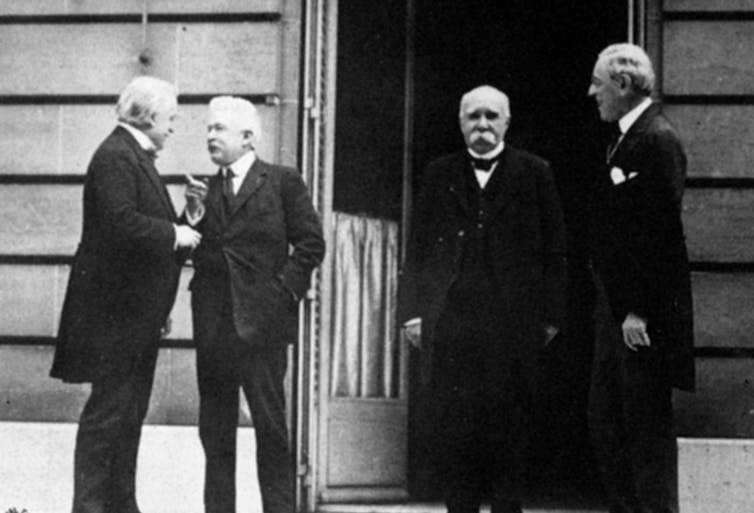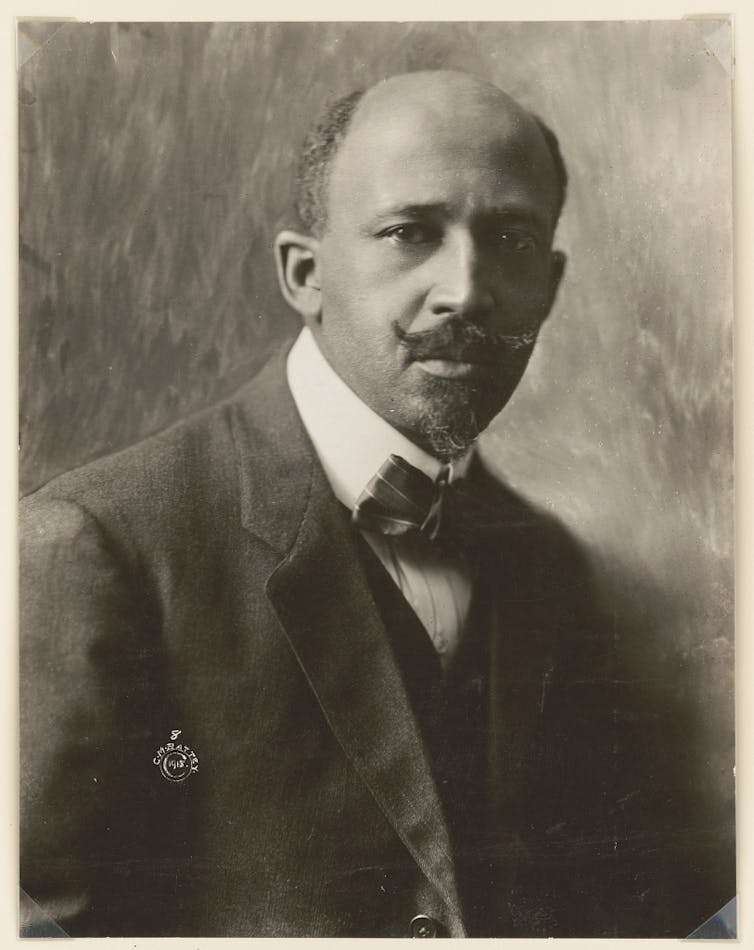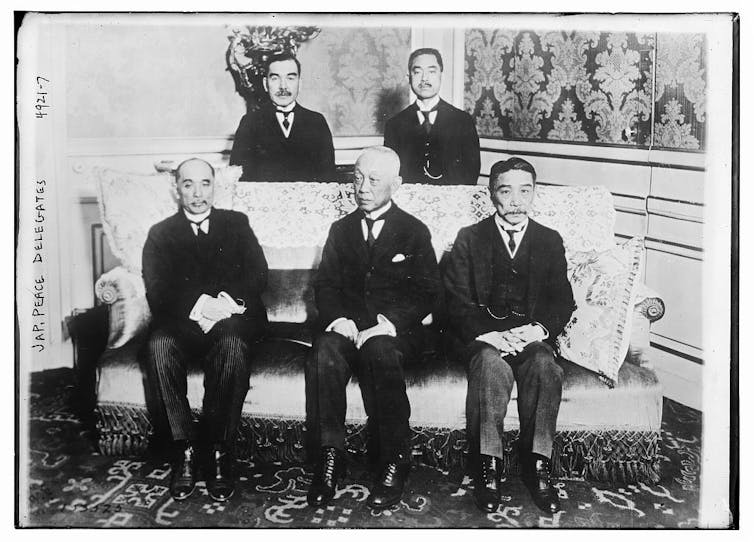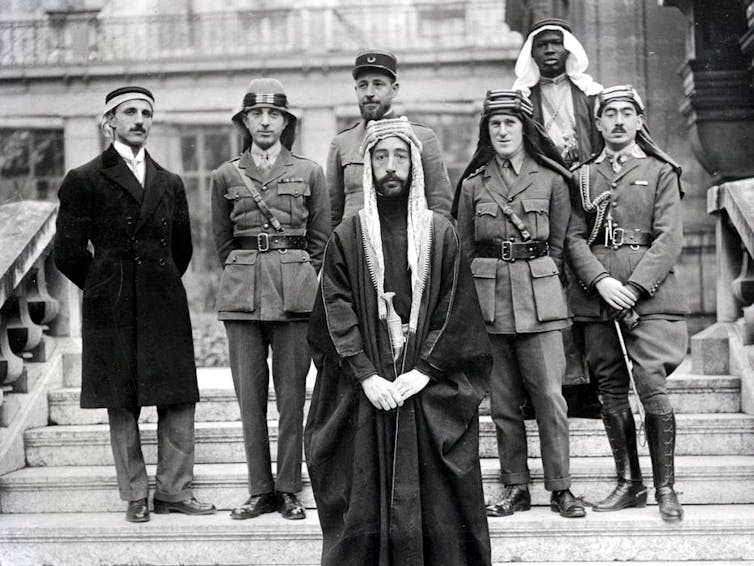
Experts in autocracies have pointed out that it is, unfortunately, easy to slip into normalizing the tyrant, hence it is important to hang on to outrage. These incidents which seem to call for the efforts of the Greek Furies (Erinyes) to come and deal with them will, I hope, help with that. As a reminder, though no one really knows how many there were supposed to be, the three names we have are Alecto, Megaera, and Tisiphone. These roughly translate as “unceasing,” “grudging,” and “vengeful destruction.”
Back to history this week. It has been obvious for a long time that the Versailles Treaty got the world into World War II. I learned that in school. But it’s less obvious how much of a factor it was in getting us into the mess we are in today. Let’s look.
================================================================
How the failures of the 1919 Versailles Peace Treaty set the stage for today’s anti-racist uprisings

Elizabeth Thompson, American University School of International Service
The racism that is now the target of protest across the globe is rooted in the tragic choices of leaders seeking to roll back change a century ago.
Nearly all historians now agree that at the end of World War I, the choice to return to an imperialist world order by the victorious Allied, or Entente, powers – France, Britain, Russia, Italy, Japan and the United States – was a historic error. It not only prepared the ground for the rise of fascism in Europe, but also sparked decades of political violence in Asia and Africa by people denied their rights and humanity.
As World War I ended in November 1918, the Spanish Flu pandemic swept across the globe, killing more than 50 million people. Most vulnerable were soldiers living in crowded barracks and their families back home, where hunger weakened immunity.
Like today, the effect of pandemic was aggravated by economic recession and unemployment. Worse, the people of the defeated German, Austro-Hungarian, Russian and Ottoman empires suffered chaos under political collapse.
Amid these multiple crises, the Paris Peace Conference opened in January 1919. American President Woodrow Wilson personally traveled to Paris to ensure that the conference would make the world “safe for democracy.”
Wilson had promised a new era of peace and justice in his famous Fourteen Points statement of war aims, which included an end to secret treaties, the curtailment of colonial empires, the right of all people to choose their own government and a League of Nations to adjudicate international conflicts.
In 1920, like 2020, race became the pivot of a historic turning point. In both moments, world leaders faced a choice: to restore the previous status quo that had produced the crisis – or to embrace the need for a new world order.
The European members of the Entente powers at Paris – Britain, France, and Italy – ignored Wilson’s call for world order based on law and rights. With the implementation of the Treaty of Versailles in January 1920, they chose to restore a racial hierarchy across the globe, extending their colonial rule over territories once held by the defeated German and Ottoman empires in Africa, Asia and the Middle East.
The treaty, which included establishment of the League of Nations, betrayed not only Wilson’s ideals, but also the Entente’s nonwhite allies and the colonial soldiers who fought in the “war to end all wars.” The racial injustice of the 1919-20 peace settlement sparked decades of political violence – not only in the colonized Middle East, Africa and Asia, but also in the United States.

Journey to Paris
In January 1919, activists from around the world traveled to Paris despite risks to their health. They embraced Wilson’s Fourteen Points as a chance to remake a broken world system of imperial rivalry that had led to World War I and the deaths of 10 million soldiers and 50 million civilians.
Among those activists was NAACP leader W.E.B. Du Bois, who had fought against the spread of racist, segregationist Jim Crow laws from southern states to the North. He now feared that a similar legal double standard might be imposed in international law, to the detriment of African rights.
Du Bois asked to join the American delegation at Paris, but the Wilson administration refused him. Wilson feared that Du Bois’ call for racial equality might spoil his negotiations with the other conference leaders – prime ministers of Britain, France and Italy – who ruled most of Africa as colonies.
Claiming rights
Undeterred, Du Bois organized a Pan African Congress to defend Africans’ rights. He understood, as others did in Paris, that racial inequality was the foundation of the old imperial world order.
Like Du Bois and his African allies, Arabs and Egyptians claimed their right to sovereignty. But they found that the Entente leaders also considered Arab Muslims a lower species of human, unfit for self-rule.
Prince Faisal of Mecca gained entry to the conference because his Arab army had fought against the Ottoman Turks alongside Britain, with the understanding that Arabs would gain an independent state. But the British broke their promise and denied independence to Faisal’s Syrian Arab Kingdom. They instead joined French colonialists to divide Arab lands between them.
Asians, too, were regarded as an inferior race. Japan had fought alongside the victorious Allies and had won a leading role at the conference.
But when the Japanese delegation proposed a racial equality clause for the Covenant of the new League of Nations, the conference’s white leaders rejected it.

Racial inequality codified
The Covenant of the League of Nations, drafted by those same leaders at Paris in 1919, codified the inequality of races in international law. Article 22 denied independence to Arabs, Africans and Pacific Islanders once ruled by the Ottomans and Germans.
In the condescending language of moral uplift, the article designated them as “peoples not yet able to stand by themselves under the strenuous conditions of the modern world.” Therefore, they would be placed under temporary European rule as “a sacred trust of civilisation.”
In other words, the League of Nations would administer temporary colonies, called mandates, to tutor uncivilized (nonwhite) people in politics. Racial inequality was enshrined in the very institution, the League of Nations, that was to ensure the governance of international law.
The mandates were imposed by gunpoint, with no pretense to respect self-determination. In July 1920, the French army occupied Damascus, destroyed the Syrian Arab Kingdom and sent Faisal into exile. Likewise, the British battled mass opposition to claim its mandates in Iraq and Palestine. Meanwhile, South Africa imposed a brutal racist regime upon southwest Africa.
Racial exclusion from the club of so-called civilized nations provoked anti-colonial movements for the rest of the 20th century.
The president of the Syrian Arab Kingdom’s Congress, Sheikh Rashid Rida, foresaw violent consequences in his 1921 appeal to the League of Nations.
“It does not befit the honor of this League, which President Wilson proposed to include all civilized nations for the good of all human beings,” he wrote, “for it to be used as a tool by two colonial states. These states seek to use this Assembly to guarantee … the subjugation of peoples.”

Rida prophetically warned that “Syria, Palestine, and other Arab countries will ignite the fires of war in both the West and the East.” The bitter sheikh turned against European liberalism and inspired the founding of the Muslim Brotherhood in Egypt in 1928.
In the later 20th century, this racial exclusion of Arab Muslims inspired the violent Islamist movements that drew the United States into seeming endless conflict in Afghanistan, Iraq and Syria.
Jim Crow stays
In the United States, racial hierarchy was similarly reimposed by violence. Black veterans returned from Europe to confront lynching and race riots.
[The Conversation’s newsletter explains what’s going on with the coronavirus pandemic. Subscribe now.]
The link between the American racial order and the new world order was made explicit by President Wilson’s adviser, Colonel Edward M. House. He advised Wilson that racial equality would cost him votes in the South and California. Worse, such a clause could empower the League of Nations to intervene in the United States against Jim Crow laws.
In March 1920, the U.S. Senate rejected American membership in the League of Nations precisely because clauses on transnational law enforcement and collective security threatened U.S. sovereignty.
It is no accident that the current crisis in the U.S. has come to focus on racial injustice. Among its several sources are the decisions made 100 years ago by white men from powerful countries who believed maintaining their dominance was more important than seeking peace through justice.![]()
Elizabeth Thompson, Professor and Mohamed S. Farsi Chair of Islamic Peace, American University School of International Service
This article is republished from The Conversation under a Creative Commons license. Read the original article.
================================================================
Alecto, Megaera, and Tisiphone, Wilson (a racist himself) probably did not envision what we would envision today as a “world order based on law and rights.” That’s nothing new. When the Magna Carta was signed, the barons who forced it did not envision a world in which anyone other than the nobility would have the rights it prescribes. When the Constitution was written and adopted, our founding fathers almost certainly did not envision a world without slavery. Even after we abolished slavery, few envisioned a eorld in which women had rights. Historically, freedom has a tendency to spread and to embrace groups those writing the rules never considered. It would be most interesting if we were able to follow the history of a parallel world which did rally behind Wilson’s Fourteen Points, and see what would have been different.
On the other hand, I was looking at some numbers – I cannot call what I did crunching because I wasn’t rigorous, and made adjustments based on guesses. I took as a starting point the premise that 30% of Americans still support Trump. I made an assumption that, while we all know that black racists, and female misogynists, and Jewish anti-Semites exist, their actual numbers would be small enough to disregard. I looked up the percentage of non-Hispanic whites in America, and learned it was a little under two-thirds. Well, 30% is almost one-third. I concluded that, as a very rough estimate, half of all the whites in the United States are racist. And we will be stuck with them long after Trump* is gone. And they vote, and they reproduce. On the bright side, without doing any math, I feel strongly that 50% is a lower percentage of racists among whites than it was in the fifties So I think there is hope. Dear Furies, help us build it better.
The Furies and I will be back.
15 Responses to “Everyday Erinyes #228”
Sorry, the comment form is closed at this time.

What a great educational post, history wise, and informative. .
I love this little neck of the woods and my spread of land, but I am surrounded by red.
Yes, you wrote it best that they will still be here, long after dt is gone.
Unfortunately.
One can hope and pray though.
Thanks, Joanne and Furies, for a good read and the history.
As usual, your article goes beyond excellent.
I am a student of history and the Versailles Treaty and its effects is an area I have studied extensively.
During the conference a young patriot went to see Wilson to ask for self-determination for his people. Wilson refused him an audience, because the right to self-determination was for whites only. Had Wilson not been a racist, he could have saved over 58,000 American lives, because that patriot was Ho Chi Minh.
History provides the roots of issues which arise and which politics debates. Thanks Joanne for this rich historical context for today.
I note the term “New World Order” which appears in so many conspiracy theories still. I suspect some opposed joining the League of Nations because colonialism was source of our own independence effort much like in Congress, on some issues, libertarians vote the same as progressives albeit for different reasons.
Read an article including Civiq’s latest poll on Trump support placing it at 31%, so your number is pretty good; also indicated it was a level that could not be changed. The challenge in your estimate is the definition with so many displaying racism claiming not to be racist. Also, white reproduction has been at less than a replacement rate for more than a decade–millennial and GenX generation, and those growing up now, are all majority something that is not non-Hispanic white. Another analysis I read this morning pointed out that the racist whites the GOP has been playing to are shrinking since so many are retirement age and dying each year.
“so many are retirement age and dying each year.”
True. But they also mostly reproduced.
Excellent article, Joanne
Interesting the way history seems to repeat itself. Reading what so many were going through this in 1919 and comparing it to what we’re facing now.
Sad that we people, especially high ranking ones, still can’t learn to treat each other equally.
All I can continue doing is to pray for peace, for all and that the “hatred acts of violence” stop.
Thanks Joanne
I’m rereading Stephen King’s 11/22/63 which speculates on the impact of “The Butterfly Effect”.
https://en.wikipedia.org/wiki/Butterfly_effect
How would have things changed if someone were able to go back in time (it’s Stephen King – of course it’s possible!) and prevent Lee Harvey Oswald from even reaching the Texas School Book Depository, and …
Hard to imagine what impact even minor changes in the course of history will have on the future.
It is hard indeed, and in a sense impossible, because even if you guess right, there’s no way to prove it. But the mental gymnastics are interesting. Iread somewhere that a historian stumbled on a book called “If the South had ost the Civil Way.” It was written from the point of view of an imaginary historian in a parallel world in which the South had won the Civil wWar, trying to imagine what had happened had they not. Wouldn’t that be a trip?
EXCELLENT summary! Thanks! (Say…is that Lawrence (of Arabia fame), second from the right, second row, adjacent to Faisal?)
It sure looks like him, doesn’t it? And the time is right. And the company is right. Did you try “Serch Google for image?
So many lost opportunities!
Excellent article. “The conversation” is an excellent source of education.
I have read, if I recall correctly, that Wilson became ill while in France, at that time, and was unable to push for his 14 points.
Thanks for an excellent read and a great lesson in history, Joanne.
Sadly we’re bound to repeat it for no other reasons that we’re humans and social animals. It’s always about power over others and the greed for the trinkets around which rules are created at that particular time: food, gold, paper with some trinket value or stockmarket shares with the same symbolic value attached or even tulip bulbs.
I had hoped at the beginning of the outbreak that the human world would take the chance to start from a new perspective but everywhere I see nations turning to the same politics, the same power-play, the same race-driven empirical belligerence, the same stockmarket-based economy and no respect for the warnings that the planet will no longer sustain our lifestyle choices.
There’s a spark of hope as some people still see the opportunity of change, but when push comes to shove and they fall victim to the old-style economies which favours a happy few, I don’t think much will change on its own accord.
Outstanding piece, Joanne. I shared it to Twitter, it’s important. Hope that brings some new people to Politics Plus. I have a bit more hope than you about the racism in America. The last two generations, my son’s generation and my grandchildren are VERY different from those that came before. They were raised in diverse classrooms, both my boys had best friends of other races. Both of my grandchildren do too, both of them have roommates in college of other races. They’re going to change America and eventually the world. Gen Z is amazing.
Something else to keep in mind. Every election since 1994 has seen a drop of 1% to 2% in the number of registered white voters, every single one. Old white racists are dying off, yes, some young ones are taking their place, but nearly enough to matter in the long run. By 2043, less than half of America will be white, right now, less than half of ALL children 15 and under are white. This is going to change everything, politics, policies both foreign and domestic. I think the republican party is all but over. I think it will be decades before a rationale, non-racist conservative party is a force in American politics again. I’ve hope, real hope. Texas is a swing state this election, it may turn blue, it WILL soon, Molly Ivins and Ann Richards legacies live on there. America is changing rapidly, for the better.
Some are worried about Trump refusing to leave (Bill Maher among them), pointing out the thugs on the streets taking orders from Trump. They aren’t paying close enough attention. Those on the streets now are NOT regular military, which cannot be used on American soil. Even if Trump was so stupid as to try, the Army, Marines, Navy and Air Force commanders will not take up arms against the union. That’s treason. I took the same oath they did to the Constitution, not a man. The articles from retired military leaders are numerous and I have yet to read even one suggesting the military should participate in precipitating another Civil War. They won’t do it. They just won’t. Trump can line up his thugs and supporters and one brigade of the 82nd Airborne or the First Infantry, in which I served in Vietnam, would wipe them out in an hour. There’s no reason to fear Trump refusing to leave, even he is not that stupid. There is a brighter tomorrow coming. I believe it.
Thank you so much, Gene. I always love reading your so-thoughtful comments. Especially when you are more optimistic than I am, which isn’t always the case!
Hi Gene, It is good to see you here, again. I can echo Joanne’s comment about your optimism, and hope, fervently that it is an accurate picture. I have too many concerns about how dumpy might claim that the election is his.
However, there has been a flurry of news this afternoon, about a mounting legal offense towards his USPS manipulations, from the N.J. state AG, to Rep. Connolly, of Va, to a serious “request” that DeJoy appear before congress next week. If this issue can be rectified, trump’s chances diminish.
Thanks, I’ve read other stories about this over the years, but this is nice and concise…..and clear….